Occupy Sandy Should Not Act as an NGO to Replace Bad Governance
By Gilbert Mercier and Dady Chery
Sandy and Katrina Expose the Third World Within the Empire
The last natural disaster to have had a major impact on the United States was hurricane Katrina. The fiasco of dealing with Katrina’s aftermath was a big blow for the Bush administration. This exposed a broken social system where the poor were left behind to fend for themselves while the rich left comfortably, and the government at all levels — local, state and federal — remained grossly incompetent. Katrina blew the lid off of America’s thinly covered dirty secret: social inequity and racial discrimination are worse than they were at the peak of the civil rights movement. Although climate change has a way of exposing the stark horror of poverty, the numbers have always been there for all to think about.
Back in 1967, Martin Luther King Jr considered the US figures on child mortality, home ownership, and net worth, etc., and he concluded that “Of the good things in life, the Negro has approximately one half those of whites. Of the bad things of life, he has twice those of whites….” In 2012, the net worth of US Blacks and Latinos is 20 times lower than that of Whites. What does it mean for Latinos to have a median net worth of $6,300 and for African Americans to have one below $5,700? They now call it food insecurity, but it is hunger that hits people in the belly. MLK’s struggle to put behind this country hideous original sin of slavery must be fought all over again.
When now-disgraced politician John Edwards spoke about “the two Americas,” he was right. There are two Americas: unequal and largely segregated. The extreme socioeconomic apartheid between the rich and poor has been exacerbated by the financial crash of 2008, and nowhere is it more evident than in New York City. Since the 1970’s NYC has changed from hosting a comfortable cohabitation of the working poor, middle class, and the rich, to becoming a city of coffee shops, book stores, restaurants and designer stores. In the mornings, the rich drive to their mostly financial and publishing jobs as the poor pour in from the other boroughs, packed like sardines on the subways, to clean and guard the multi-million dollar condominiums, walk the purebred dogs and push the strollers of in-vitro produced children to the parks. By afternoon, most of the brown faces disappear, and it is the time for the locals to take in the restaurant dinners and Broadway shows that cost hundreds of dollars per person. Meanwhile many of the homeless prepare to sleep in their underground tunnel neighborhoods.
MLK could easily have built a movement to supply food, blankets, and diapers to needy African Americans. Indeed, he was harshly criticized by various liberal clergymen for being a troublemaker who wanted rapid change. Decades later, as climate change exacerbates life for those already on the edge, the arguments are the same. Do we put a band-aid over the lash wounds, or do we stop those who are administering the beatings? Haiti has been at the heart of the disaster capitalist program. For years, the non-governmental organizations (NGO) have administered palliatives to suppress a popular revolt as the country’s once-lively agricultural economy was displaced by a $0.43 per hour sweatshop economy and a ruthless UN military occupation. With the advent of the UN-introduced cholera, NGO such as the Red Cross, Medecins Sans Frontieres (MSF) and Partners in Health (PIH) failed to control the epidemic and instead organized to stay for the long term. For years, Haitians have appealed to the world for solidarity against this parasitic onslaught and also warned that everyone was one disaster away from becoming a Haitian, but the appeals have mostly fallen on deaf ears.
Sandy hit the North American eastern seaboard two weeks before US elections that had omitted the topic of climate change from the political debate. The timing could not have been worse for the charade that was being passed off as a democratic election. In NYC, New Jersey, and Staten Island most of the dead remain nameless. Many of the living are without electricity or drinking water. Over 40,000 are homeless and looking at the prospect of a front of cold weather. MSF offered to assist the city but was summarily rejected. The analogy to Haiti was simply too much.
Is the United States Turning Into a Banana Republic?
Sandy was not a welcome election surprise for the Obama administration. Two days after the storm hit the East Coast, president Obama made an official announcement, broadcasted on cable news channels and National Public Radio, urging Americans to donate to the Red Cross to help the victims. This was stunning. Why would the “leader of the free world” call on a charity organization to do a job that should be done by a governmental structure like the Federal Emergency Management Agency (FEMA)? Why are local and state governance so powerless that they cannot handle a disaster that was a large tropical storm and not even a hurricane? Just like after Katrina, US citizens are finding out the hard way that they are on their own; that all instances of government are broken and in such a state of disarray that the “most powerful man in the world” is calling the Red Cross to the rescue. After Haiti’s January 2010 earthquake, the Red Cross received the lion’s share of the popular donations. It stands accused of delivering unclean water to Haitians as purified water, and building luxury hotels with funds that were meant to assist the poor. FEMA has also enjoyed its share of scandals, including the provision of formaldehyde-laden trailers to Katrina’s homeless and the transfer of the same trailers to Haiti as school buildings that caused illness in children.
Broken Governments Cannot Be Fixed by Charity
Without any contingency plan for a disaster and with many desperately needy taxpayers, New York looked for a while as if it was about to explode into a popular revolt immediately before the presidential elections. The last organization one would have expected to assist president Obama was Occupy. But Occupy is saving the day by morphing into a massive NGO that is even using churches as its venues. Simultaneously, days before the elections, Occupy declared that it was much too busy helping the poor to bother with discussions of electoral politics. The soup-kitchen initiative got a big build up from Slate — a magazine that openly supports Obama — with an article written by unabashedly pro-Obama Innovations Editor Katherine Goldstein about the superiority of Occupy to the Red Cross. Until then, Occupy had been the only movement in the US to try to shine a spotlight on the notion of extreme inequality, where one percent of the population controls most of the wealth and all the political power. Occupy, at least at the start, was about social justice in its inspiration, just like MLK’s civil rights movement was about ending racial discrimination. But MLK understood that, more than anything, the poor needed to become empowered. That justice and solidarity were needed, not charity.
In a functional government, citizens pay taxes so as to be provided with a decent social safety net. Further, the same taxes, either local, state or federal are supposed to improve and maintain a country’s infrastructure. A perfect example of neglect was the fact that some of the pumps in New York’s subway system were 100 years old. In the United States, a large portion of the tax revenue is spent, not on infrastructure but on repression — such as the monstrous prison system — and on wars such as the fictional “war on terror”. Plenty of government money is spent on the Department of Homeland Security, which heads both FEMA and the Transportation Security Administration (TSA). Yet, the administrative structures in question, in time of needs, function more like tools of repression against the citizens than emergency services for the public. If governments do not govern, why do people pay taxes? As for Occupy: it has no business in becoming yet another NGO crutch for bad governance. Haiti has become the showcase for a failed state. It is not the last one. Soon enough we will all become Haitians unless we all, as citizens of the world, take our destinies in our own hands.
Editor’s Note: All photographs by Karen Blumberg.
Related Articles


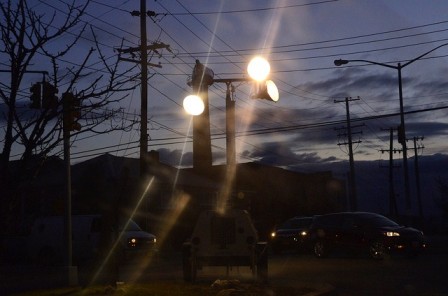
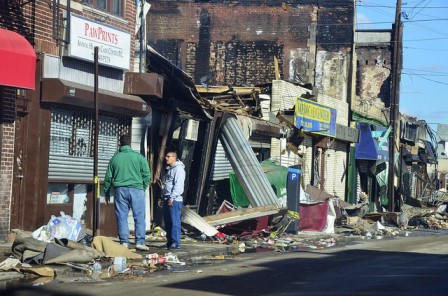
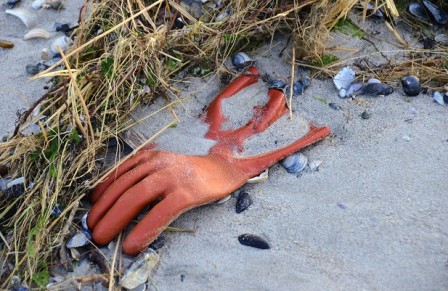
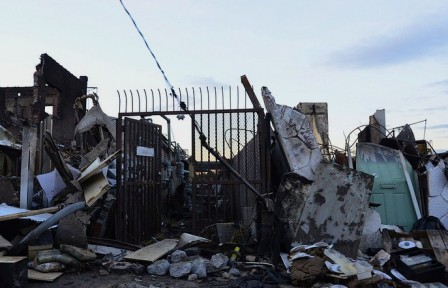

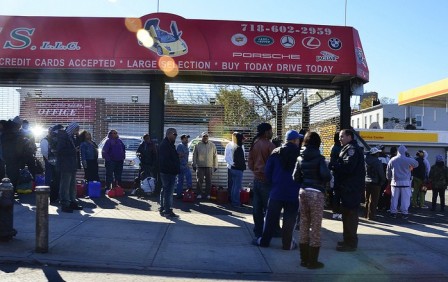
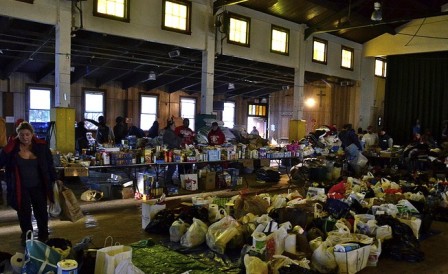












22 Responses to Occupy Sandy Should Not Act as an NGO to Replace Bad Governance
You must be logged in to post a comment Login